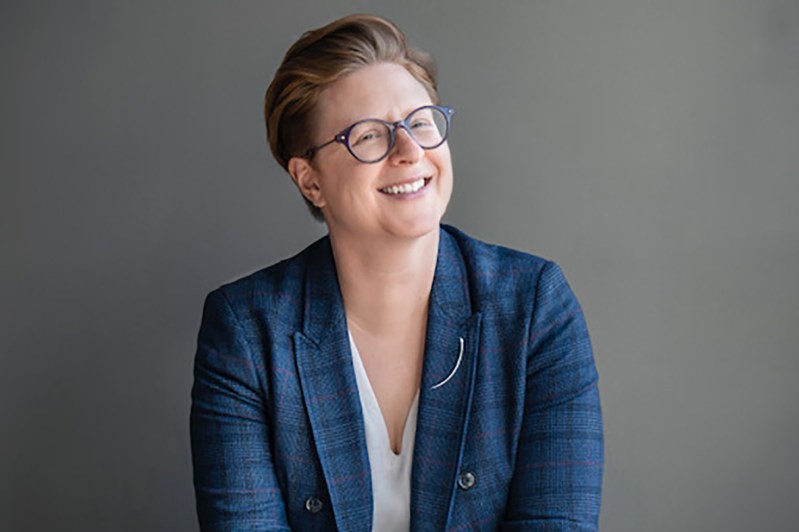Like the proverbial train wreck from which we just can’t pry our eyes, there is something electrically compelling about the story of a big business falling apart. Or, in many cases, it’s more of an implosion, and in some cases an implosion brought on by fraud and allegations of sexual misconduct — so goes the story of televangelists Jim and Tammy Faye Bakker, who ran the collapsed Heritage USA, a Christian-themed amusement park.
A big business catastrophically breaking apart makes for a good story, but a good storyteller is still needed. And that’s where Lauren Ober steps in. As she explains: “Business stories are just human stories, but with lots more money involved.”

The Pittsburgh native was no stranger to sharing stories when she accepted the host’s chair of the new American Public Media podcast, in partnership with the Carlson School of Management at the University of Minnesota, Spectacular Failures, and she was no stranger to audio journalism, either. “I was a newspaper reporter for many years before I even moved into radio,” she explained, “which I did in 2012. So I’ve been in audio since then. I worked for WAMU, the NPR station here in DC, and I hosted a show for them called The Big Listen which got picked up by NPR national … the opportunity for Spectacular Failures popped up last year, and I jumped on it.”
“We also want to see certain people triumph … In America, failure doesn’t have to end you.”
Lauren wants potential listeners to understand one thing first and foremost: this is not a show for business experts; you can enjoy listening to Spectacular Failures whether you have an MBA from Villanova or you don’t know a derivative from a daguerreotype. At the heart of the show are stories about the people who ran failed businesses, explaining what happened and why. It’s not a business show, in other words.
“I didn’t know anything about business at the time [the host opportunity arose] — I was a casual observer, a news consumer, but if you had asked me what collateralized securities were, I would not have had a fluent answer. The mandate of this show was to make a narrative program that regular non-businesspeople would enjoy. The stories we have chosen have lots of characters in them, the background just happens to be about businesses,” Lauren says.
So what are the types of stories Spectacular Failures covers and who are these characters therein featured?
Meet Leonard. He's a breweriana aficionado. Specifically, he collects Schlitz beer memorabilia like tap pulls, trays, and bar mirrors.
Never heard of Schlitz? Find out how a company that was once the largest beer producer in the U.S. ceased to exist: https://t.co/gIiMb2dpC1 pic.twitter.com/u6dIp1ZSDf
— Spectacular Failures (@FailureShow) July 3, 2019
Well, there’s the episode called “Schlitz Beer goes bad, then worse,” for example. That one is about how “‘The beer that made Milwaukee famous’ cuts corners and loses its most loyal customers.” In that episode, Lauren and her team tell the story of Schlitz, a beer brewed since 1849 and by the 1970s a neck-in-neck rival of Anheuser-Busch for the title of biggest brewery in America. “And then, seemingly overnight, Schlitz was gone.”
Further Reading
- Financial Planning 101: What to Do ASAP to Build Long-Term Wealth
- 11 Best Business Books to Help You Achieve Success on Your Terms
- Pro Interview Tips That Will Help You Land Your Dream Gig
So what happened? In short, a series of unfortunate but entirely avoidable events. In 1970s, a misguided cost-cutting initiative saw the brewery swap out much of its malted barley for cheap corn syrup and the use of a number of other cheaper ingredients as well. The new formula tasted terrible and many Schlitz fans quit the brand. Facing declining sales, in 1977 the company launched a disastrous ad campaign featuring angry men effectively threatening the viewer if they switched beers. In response, even more people switched beers. Next, the company began using a cheap anti-hazing additive which had a reaction with the beer and led to the recall of more than 10 million bottles of Schlitz beer. By 1981, the once mighty brewery was no more, bought by Bud.
Don’t worry, Lauren’s show makes the whole saga more colorful than that, as it does in every half-hour episode. Through a blend of interviews, narrative monologue, music, sounds recorded on location, and archival clips, Spectacular Failures makes excellent use of its medium to tell stories about everything from the total flop that was MoviePass to the David and Goliath story of a family-owned funeral parlor taking on a billion-dollar, multinational company … and winning.
https://www.instagram.com/p/BzJVczXFhrF/
What draws us to these topics? The same things that attracted Lauren Ober to the show in the first place. “I think there are two things. First, I mean there’s a healthy dose of schadenfreude, these are people we like to see bad things — well, not bad, but unfortunate things — happen to; a certain kind of people and not to us. But we also want to see certain people triumph. We want to see that failure is not going to end you, and I think in America — and [for] other places this isn’t true — in America, failure doesn’t have to end you.”
She adds: “We also like failure because it’s relatable. Who among us hasn’t failed?”
Binged all of Spectacular Failures? Check out these other great podcasts.



